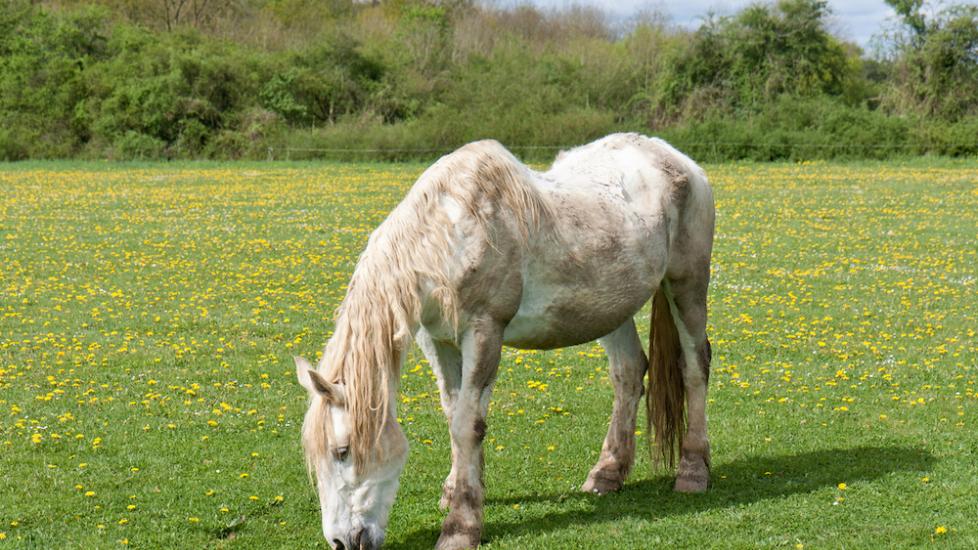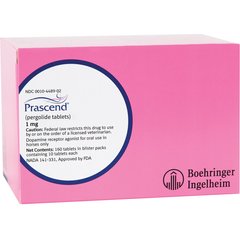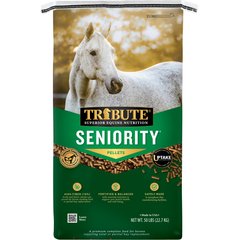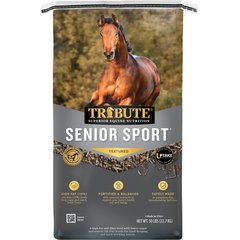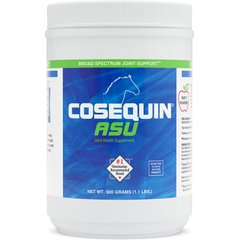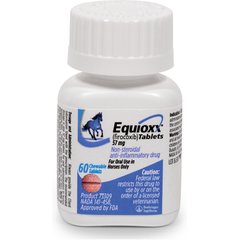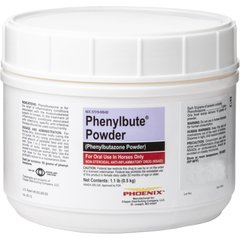Caring for an Older Horse: Health and Nutrition Tips
iStock/kruwt
Just like a human, an older horse needs extra attention paid to their health as they age. While most older horses can continue working as they did in their younger years, there are a few important factors to keep in mind when providing for their health and overall care.
Key Takeaways
- Senior horses experience bodily changes as they get older.
- Providing a senior feed for horses is key to their overall health.
- Older horses may need additional nutritional supplements such as joint support.
- Age is not a reason to retire an old horse if they are still comfortable and happy being in work.
- Work with your veterinarian to determine what lifestyle is best for your older horse.
When Is a Horse Considered a Senior?
Typically, a horse is considered a senior between the ages of 15–18. But the age classifying a horse as “senior” has drastically changed in the last century.
At one time, a horse living to be 25–30 was considered very old. Today, it’s common to find very healthy horses between 25–30 years old.
Advancements in equine healthcare and nutrition have increased the horse lifespan and the number of useful years of enjoyment we have together.
However, every horse is an individual and may not start showing signs of aging at the same time.
Health Changes in an Older Horse
Between the age 15–18, your older horse may begin going through health changes, including:
Digestive Tract Changes
Older horses will commonly have dental issues as their teeth wear out or become loose. Because of this, weight loss, loose manure, and even chronic diarrhea can result, as the digestive tract is less able to absorb nutrients.
An aging horse also has a higher chance of some types of colic, such as those that involve a blockage due to fat tumors called lipomas.
Bone, Muscle, and Joint Changes
Older horses experience many common ailments with their bones, muscles, and joints:
-
Arthritis is a commonly seen in older horses. This may cause stiffness or limit the range of motion or exercise a horse can perform comfortably.
-
Laminitis (also called founder) is more common due to a horse being more prone to developing Cushing’s disease as they age.
-
Muscle wasting (muscle loss or decreased muscle tone) is more common on a horse’s topline with age.
Immune System Changes
Older horses are more at risk for infection including, parasite infections such as strongyles, pinworms, bots, and tapeworms.
Cushing’s disease puts this age group at a greater risk because it causes high blood levels of cortisol in the body, a hormone which decreases the immune system’s responsiveness.
Respiratory Tract Changes
Recurrent airway obstruction (heaves), similar to asthma in humans, tends to worsen as a horse ages.
Over time, simple management practices like soaking hay before feeding may not control a horse’s symptoms; your horse may eventually need daily medication to keep them comfortable.
Senior horses are also more likely suffer from secondary viral or bacterial respiratory infections due to their naturally weaker immune system.
Reproductive Tract Changes
Pregnancy is more difficult to achieve and sustain in older horses.
In mares, age-related progressive degeneration of the uterine lining can occur, and eggs that are produced by the ovaries becomes less fertile. In stallions, sperm quality and quantity may decline.
Cardiovascular System Changes
With aging, changes may impact the heart and vasculature, which carries blood through the circulatory system to the rest of the body, leading to heart failure or sudden death in older horses if a major vessel ruptures.
Nervous System Changes
Overall aging changes can cause a slight decrease in coordination, which can reduce agility/athleticism.
Arthritic changes specifically in the neck or spine can result in progressive lack of coordination.
Endocrine System Changes
As horses age, abnormal hormone production by the pituitary gland at the base of the brain results in pituitary pars intermedia dysfunction (PPID), or Cushing’s disease. Cushing’s disease is one of the most common diseases seen in horses greater than 15 years old.
It’s estimated that 20% of horses at 15 have Cushing’s disease and 20–33% of horses will develop Cushing’s disease by age 20. These horses often need daily medication like Prascend® and low-starch diets.
Older horses also may be less able to handle environmental stress such as wind, wet, and cold. This is especially important for winter weather.
Senior Horse Care Tips
Care for your senior horse requires paying extra attention to their comfort level as well as adjusting their lifestyle regimens to keep them happy and in top shape.
Exercise
Daily light exercise or turnout can help maintain a horse's soundness and comfort as they age. Also, providing long warmups and cool downs like going for a long walk around the property can be helpful.
If your older horse is still in regular work, it’s important to remember to gradually increase their workload after being off for a period of time.
Saddle Fitting
If you notice your horse is starting to lose back muscle or topline, it’s important to check their saddle fit to make sure they are not getting any back sores or are becoming uncomfortable.
Body Condition Score (BCS)
Maintaining your older horse at the ideal body condition score is important, as added weight can put added stress on their joints and body, increasing their chances for arthritis and lameness.
An underweight horse will also have a hard time maintaining normal body functions such as temperature control, especially in winter. Make sure you have the appropriate horse blankets for them.
Hoof Care
Regular trimming and shoeing can help provide good hoof balance and promote even weight-bearing, therefore adding less stress on your older horse’s joints.
Routine Physical Exams
It’s important to be proactive with your senior horse's care. Detecting problems early with annual or biannual physical exams is incredibly important to maintain your horse’s health.
An exam should include:
-
Physical exam which includes listening to the heart, lungs, and digestive tract
-
Dental exam
-
Body condition scoring and body weight estimation
-
Soundness exam
-
Vaccine plan
-
Fecal exam
-
Routine blood work such as complete blood count, chemistry, and an endocrine panel to look at ACTH, insulin, and glucose and baseline organ function
Routine Vaccinations and Deworming
A senior horse's immune system will typically decline, making them more prone to disease and parasites. It’s critical to keep up with their annual vaccination and deworming.
Talk to your vet about the best vaccination and deworming plan at your horse’s routine exam.
Senior Feed for Horses
Providing your senior horse with a high-quality diet is very important as they age. Major feed companies such as Tribute® (Seniority or Senior Sport) make “senior” diets that are often pelleted feed that is easy to chew and digest and contain more energy.
Old Horse Supplements
There are many horse supplement options to consider for your older horse. Most commonly, senior horses will benefit from a joint supplement with glucosamine and chondroitin such as Cosequin®.
Based on your horse's specific needs, your veterinarian may recommend other supplements to help maintain your horse’s health.
Dental Care
A dental exam should be performed at least once per year.
Some older horses may need a dental exam performed every six months as their teeth wear and become less efficient. Often when this happens, they are not able to chew their food as well, and you will see weight loss or even choke.
If you notice any weight change in a senior horse it is always best to call your veterinarian right away for an exam.
Medications
Due to arthritis or other reasons causing lameness or pain, some older horses may benefit from a non-steroidal anti-inflammatory medication such as Equioxx® or bute. Only use these if recommended by your veterinarian as they can cause other medical issues such as a gastric ulcer, colic, and diarrhea.
Cancer
Gray horses commonly develop melanomas as they age. Places to examine for lumps include the eyes, muzzle/lips, vulva, penis, tail head and rectum. Contact your veterinarian if you notice any lumps or bumps on your older horse.
When Is It Time to Retire a Horse?
The exact age to retire a horse will be different for everyone. As long as your older horse is comfortable and happy to continue to do their job, age is not a reason to retire them.
If you have any concerns about the comfort level or ability for your horse to do their normal routine, have an exam performed by your veterinarian to assess your horse’s health and develop a unique senior horse care plan.
References
Caring for your senior horse. University of Minnesota Extension.
Hiney K, McFarlane D. Caring for the Older Horse. Oklahoma State University. 2017.
Older Horse: Special Care & Nutrition. AAEP.
Ony EE. Taking Care of the Senior Horse. Kentucky Equine Research. 2000.
